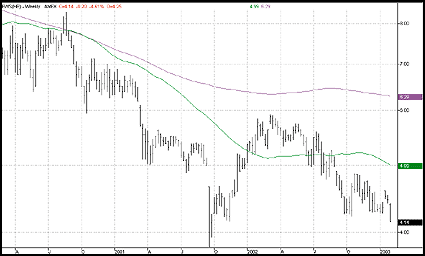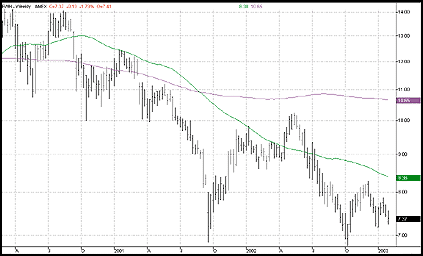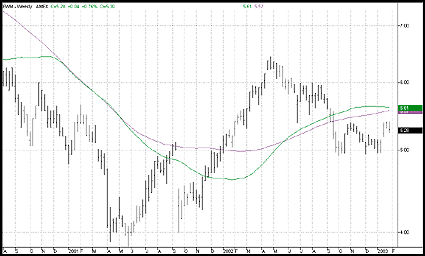INTERMARKET REVIEW
MSCI SINGAPORE INDEX FUND

The MSCI Singapore Index Fund is an exchange-traded fund (ETF) product (iShare) from Barclays Global Investors. The ETF is designed to track the Singapore equities market, as tracked by the Morgan Stanley Capital International (MSCI) Singapore Index. The largest holdings in the MSCI Singapore Index Fund (EWS) are DBS Group Holdings Limited (16%), United Overseas Bank Limited (15%), and Oversea-Chinese Banking Corp. Ltd. (11%). These holdings reflect a strong fund weighting toward banks (43%), with other sectors such as transportation, capital goods, and real estate also being well-represented (approximately 9% each).
The Singapore equities market has been under pressure for the past two years, sinking beneath both its 50- and 200-week moving averages late in 2000. An autumn rally in 2001 brought Singaporean stocks up above the 50-week moving average for a few months in 2002, but the advance was not strong enough to keep these stocks moving upward, as they fell again later in the fall of 2002.
What they say: "Singapore has been a model of national strategic planning, a talent that drove its growth ... last century and provided a buttress against regional problems in the last decade. But the strategic plan is running out of options fast with the rise of China and the improving competitiveness of neighboring economies. Already a war against Iraq has been factored into the strategic planners' equations - namely a drop in Gdp of 0.03%, according to two reliable sources." From "Singapore economic and consumer outlook worsens," Asia Market Research News, asiamarketresearch.com: November 20, 2002.
MSCI HONG KONG INDEX FUND

The MSCI Hong Kong Index Fund is an exchange-traded fund product from Barclays Global Investors. The fund is geared toward tracking the Hong Kong stock market as represented by the Morgan Stanley Capital International Hong Kong Index. A relatively diverse fund, the largest holdings in the MSCI Hong Kong Index Fund (Ewh) include Hutchison Whampoa Ltd. (16%) and Cheung Kong Holdings Ltd. (12%). The top sectors vary from real estate (27%) and capital goods (18%) to banks (16%) and utilities (15%).
The Hong Kong stock market has traded much like that of Singapore, with weakness becoming pronounced in late 2000 and a final collapse beneath the 50- and 200-week moving averages early in 2001. As with the Singapore equities market, Hong Kong stocks as a group bested their 50-week moving average by the summer of 2002, but these gains were relatively short-lived, as EWH moved back beneath the 50-week moving average by the fall of 2002.
What they say: "All in all, it appears that, by ensuring a higher level of security [at ports], Hong Kong could be sacrificing some of its renowned efficiency and flexibility and could see operating costs go up, as the port is already seeing its competitive advantage being eroded by the accelerating development of modern ports in mainland China." -Denise Yam, from "Hong Kong: Efficiency versus security," Morgan Stanley Global Economic Forum: January 30, 2003.
MSCI MALAYSIA INDEX FUND

The MSCI Malaysia Index Fund is an exchange-traded fund product from Barclays Global Investors. The fund is designed to track the Malaysian stock market as represented by the Morgan Stanley Capital International Malaysia Index. The fund is quite diversified, with its largest position, Malayan Banking Berhad, representing only 9% of the fund's holdings. Top sectors in the MSCI Malaysian Index Fund include banks (18%), hotels and restaurants (13%), utilities (12%), and telecommunications services (12%).
The Malaysian equities market fell in late 2000, like many other Asian equities markets. However, Malaysian stocks showed surprising strength in the fall of 2001, moving up above both the index's 50- and 200-week moving averages. While EWM did sink beneath these long-term moving averages late in the fall of 2002, the fact that the index remained relatively close beneath the averages suggests that, in a land of weak markets, Malaysian equities may be proving higher relative strength.
What they say: "Five years after Asia's financial crisis, ... the government agency charged with cleaning up the bad debts of Malaysia's banks ... is back at square one. In November, the country's appeals court ruled that its powers to force restructuring without going through the courts was unconstitutional. Unless [Malaysia's highest court] reverses the decision, it may prompt a new wave of time-consuming lawsuits." From "Caught up in court," The Economist: January 4, 2003.
MSCI JAPAN INDEX FUND

The MSCI Japan Index Fund is an exchange-traded fund product from Barclays Global Investors. The fund is built to follow the Japanese stock market overall, as represented by the MSCI Japan Index. The fund is well-diversified with major Japanese companies, including Toyota Motor Corp. (over 5%), Sony Corp. (3%), Ntt DoCoMo (3%), and Takeda Chemical Industries (over 2%). Top sectors represented include technology hardware and equipment, automobiles and their components, and consumer durables and apparel.
The Japanese stock market remains in a long-term bear market, with declines in late 2000 that took the MSCI Japan Index Fund beneath its 50- and 200-week moving averages only the latest phase of that decline. Like the markets in Hong Kong, Singapore, and elsewhere in Asia, the Japanese equities market has yet to fall meaningfully below its long-term lows (autumn 2001 for Hong Kong and Singapore; early 2002 for Japan) following rallies in the first half of 2002. But evidence of a bottom is no more or less apparent than evidence of even lower prices for Japanese stocks.
What they say: "Just how low can Japan's interest rates go? Try this answer: below zero. On Friday, for the first time, the benchmark overnight interest rate fell below zero as lenders, looking for a place to park some of the trillions of yen the Bank of Japan has pumped into the country's financial system, ran out of paying borrowers." -Chris Cooper of Bloomberg News, from the International Herald Tribune: "In Japan, it pays to borrow overnight," January 28, 2003.
Originally published in the July 2003 issue of Technical Analysis of STOCKS & COMMODITIES magazine. All rights reserved. © Copyright 2003, Technical Analysis, Inc.
Return to July 2003 Contents